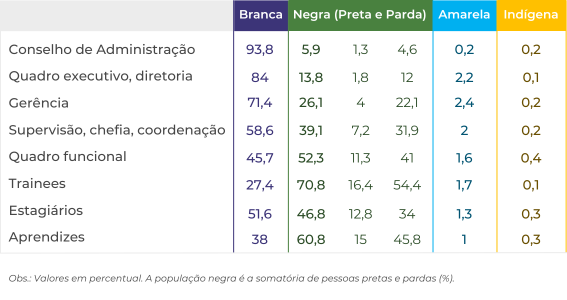
Gender equality is the focus of most of the practices and actions of the largest Brazilian companies when it comes to diversity. Research recently released by Ethos Institute of Business and Social Responsibility indicates that most initiatives with this objective, 78.2% of the participating companies, seek to reduce inequalities between men and women. In second place are measures related to reducing inequalities between white and black people, with 21.1%.
One of the study's conclusions is that awareness of the issue has been increasing in the corporate world. Between 2010 and 2024, the percentage of leaders in Brazil who consider the participation of women in company management to be below what it should be increased from 55.2% to 66.7%. In the case of the presence of black people, the percentage increased from 54.3% to 86% in the same period. Even so, the affirmative action policies that accompanied this increased perception of inequality are now reflected in a hierarchical narrowing: diversity is greater in entry-level positions than in executive positions.
Conducted between September 2023 and March 2024, the most comprehensive and in-depth survey on Brazil's diversity, equity and inclusion agenda concludes that companies are acting from the perspective of "ranking" diversity. This means that they first try to combat gender inequality and then tackle other disparities, and so on. Social, Racial and Gender Profile of the 1,100 Largest Companies in Brazil and their Affirmative Actions was made in partnership with IPEC – Intelligence in Research and Strategic Consulting, based on the Valor 1000 edition (2022).
The study is not limited to pointing out data demonstrating that companies have included diverse people at different hierarchical levels, but have not always managed to generate inclusion and belonging. It also shows that the DE&I agenda – with a reputational impact by ensuring more innovation and creativity, greater talent attraction and greater engagement with customers and the community, among other stakeholders – needs to be approached in an intersectional way. This means that diversity of gender, race, sexual orientation and age, people with some type of disability, among others, needs to be sought in a more integrated manner, ensuring that society is better represented in companies.
An inspiring aspect revealed by the study is that 91.6% of the companies that develop some action or policy aimed at equal opportunities establish in their mission and code of conduct the values that incorporate diversity and the principles of equality; 90.5% include diversity in onboarding actions; and 81.1% train recruitment professionals with the aim of improving their knowledge on the subject.
Distribution by gender in hierarchical levels
(in %)

Distribution by color or race in hierarchical levels
(in %)

Check out, briefly, some of the recommendations made by the survey:
- The private sector needs to develop strategies that can go beyond the inclusion of diversity. This is because companies have managed to include diverse people at different hierarchical levels, but they are not always able to generate inclusion and belonging.
- Being a diverse company is not the same as being an inclusive company. Companies may consider themselves diverse because they are made up of people with different characteristics, backgrounds and cultures. However, they may not be inclusive because they do not yet have diversity at different hierarchical levels, especially in senior leadership positions.
- Companies need to be careful about their positioning and the way they communicate. The study shows that 96.8% of the companies that develop actions seeking equal opportunities ensure that their communication does not reproduce campaigns with discriminatory content; 90.5% publicize their commitments to the diversity agenda in their communication channels; 76.8% make an effort to publicize good management practices that promote human rights and respect for minority groups; and 75.8% adopt inclusive language in their communication.
- The actions developed by companies cannot be exclusive to their parent companies. They must be extended to all stakeholders belonging to the value chain or production chain of companies, promoting and guaranteeing rights from end to end in the process.



